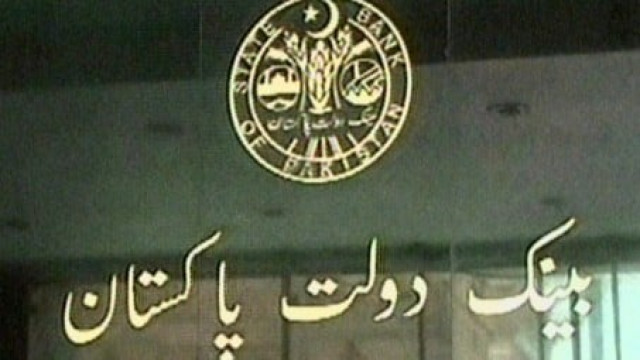Federal treasury: State Bank’s ‘hidden liabilities’ swell to $2.1b
These forward contracts, covered by letters of credit, will mature in a year.

The hidden liabilities of the State Bank of Pakistan (SBP) due to massive exposure to forward contracts have swelled to $2.1 billion that will have to be paid within a year and may bring down the foreign exchange reserves, putting the rupee under pressure.
Sources told The Express Tribune that SBP’s foreign currency assets would drop by $2.1 billion due to maturity of short-term liabilities. An insider described these as “hidden liabilities”, having severe implications for the stability of exchange rate. These liabilities are over and above current account liabilities.
According to the sources, the International Monetary Fund (IMF) was closely watching the maturity of forward contracts as economic managers were negotiating a shadow programme with the Fund. They added the IMF was “tracking the issue” but could not raise the flag as “it will create panic”.
A forward contract is one in which delivery of the commodity is made in the future, but the price is determined on the initial trade date.
The massive exposure to forward contracts effectively leaves the SBP with $9.816 billion while banks’ reserves are around $4.5 billion, taking the country’s reserves to $14.31 billion by deducting maturing liabilities, according to an expert of the financial sector who has experience of working with the central bank from 2000 to 2006. He went on to say that reserves of $16.5 billion, as declared by the SBP in its weekly announcement, were inflated ones.
However, it is not clear how much of the forward contracts are direct liabilities of commercial banks, but according to an official the amount is below $500 million.
An erosion of $2 billion from the reserves may put the rupee under strain. The rupee has already been traded at a low level of 91.05 to a dollar.
Sources said the issue of hidden liabilities first surfaced in September last year and before that even the finance ministry did not know about these forward contracts which stood at $1 billion at that time.
The central bank’s reserves are already under pressure due to larger than expected current account deficit – the gap between external receipts and payments. Against the finance ministry’s projection of a $2.7 billion gap, the current account deficit has crossed $3 billion by the end of March, with three months still to go before the close of fiscal year.
“All these forward contracts are protected by letters of credit and these will have to be honoured as maturity dates arrive,” said a central bank official. The central bank allowed forward contracts in 2010.
An official, who was involved in the decision, said the SBP made a mistake by leaving these contracts open-ended. It should have placed an upper limit of $1 billion and allowed the contracts on first-come-first-served basis, he added.
State Bank explains
“It is correct that among the drains on reserves are short and long positions in forward contracts, which stood at $2.1 billion on February 29, 2012,” said Syed Wasimuddin, chief spokesman for the SBP.
However, he argued that this figure should not be seen in isolation and should be viewed “in the context of different categories of foreign currency assets.”
He said the SBP’s liquid reserves on April 13 stood at $11.971 billion, which could be immediately converted into cash. It should not be mixed up with future commitments becoming due in the next 12 months as stated in ‘international reserves/foreign currency liquidity”.
Short-term commitments represent the future and should not be confused with the liquid “near cash” balance, said the spokesman.
Published in The Express Tribune, May 2nd, 2012.



















COMMENTS
Comments are moderated and generally will be posted if they are on-topic and not abusive.
For more information, please see our Comments FAQ